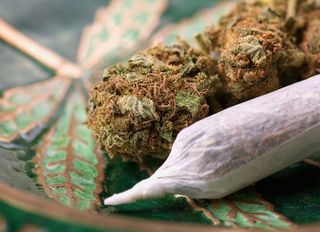44 Percent of Americans Say They've Tried Pot

Have you ever toked up? Sparked a spliff? Smoked weed? If you have, you're not alone — 44 percent of all Americans surveyed in a new Gallup poll say they've tried marijuana.
Gallup has been asking Americans about their pot-smoking habits since 1969, when only 4 percent of Americans admitted to having tried marijuana. Clearly, times have changed. For one thing, marijuana is now legal to use recreationally in four states (Colorado, Alaska, Washington and Oregon), plus the District of Columbia.
Americans' willingness to answer "yes" when asked about trying cannabis has steadily increased over the past 50 or so years, according to Gallup research.
In 2013, 38 percent of those surveyed in a similar poll said they had smoked pot at least once, which means that the total number of affirmative answers to this question jumped by 6 percentage points in just two years. However, the researchers who conducted the poll aren't sure if all of these "yes" answers correspond to an actual increase in the percentage of people who have tried pot or an increase in the percentage of people who are willing to admit that they've done so. [11 Odd Facts About Marijuana]
In addition to polling Americans on whether they've tried marijuana, Gallup asked 1,009 adults age 18 and older if they currently smoke the green stuff. Slightly more than 1 in 10 respondents, or 11 percent, said they do smoke pot. Only 7 percent of respondents admitted to toking up back in 2013 (though that slight increase in percentage points is within the poll's margin of error, according to the researchers). For comparison, 19 percent of those polled this year said they currently smoke regular cigarettes.
To get a better sense of who is toking up, the Gallup researchers combined data from polls conducted in both 2013 and 2015. They found that Americans younger than 30 are most likely to say they currently smoke pot (18 percent). But adults ages 30 to 64 are most likely to say they've tried it, which makes sense, considering the wider age range included in that group, the researchers said.
Baby boomers (those born in the years following World War II) were responsible for the sharp increase between 1969 and 1973 in the number of respondents who admitted they had tried pot, the researchers said. However, the oldest baby boomers, who are now 65 or older, are among the least likely of those surveyed to say they've ever tried marijuana (only 22 percent said they had). This group was also the least likely to say that they currently smoke pot (a mere 3 percent said they do).
Sign up for the Live Science daily newsletter now
Get the world’s most fascinating discoveries delivered straight to your inbox.
The researchers found that people who regularly attend religious services are less likely to say they have tried marijuana, or that they currently smoke it, than those who don't attend religious services. And respondents who said they did not have a religious affiliation were much more likely than both Catholics and Protestants to say they smoke pot (18 percent, compared to 6 percent and 5 percent, respectively).
Men are more than twice as likely as women to say they smoke pot (13 percent compared to 6 percent), the researchers found. And nearly half of all men surveyed said they had tried pot, whereas only 35 percent of women admitted to experimenting with cannabis.
But the poll's discrepancies aren't as stark between people of different skin color as they are between genders. White people and nonwhite people are equally as likely to say they have tried pot or to say they currently smoke it, according to the researchers.
Americans of all education levels and income groups are equally as likely to have taken at least one toke, the researchers found. However, those most likely to say they currently smoke pot are respondents who earn less than $30,000 a year (14 percent). That makes this demographic twice as likely to smoke pot as those earning $75,000 a year or more (7 percent), the survey found.
And Americans with graduate degrees are less likely to say they smoke marijuana compared to those with fewer years of education (4 percent of those with graduate degrees, compared to 10 percent of those with college degrees, 12 percent of those with some college completed and 9 percent of those with a high school education or less).
Follow Elizabeth Palermo @techEpalermo. Follow Live Science @livescience, Facebook & Google+. Original article on Live Science.

Elizabeth is a former Live Science associate editor and current director of audience development at the Chamber of Commerce. She graduated with a bachelor of arts degree from George Washington University. Elizabeth has traveled throughout the Americas, studying political systems and indigenous cultures and teaching English to students of all ages.
Most Popular


